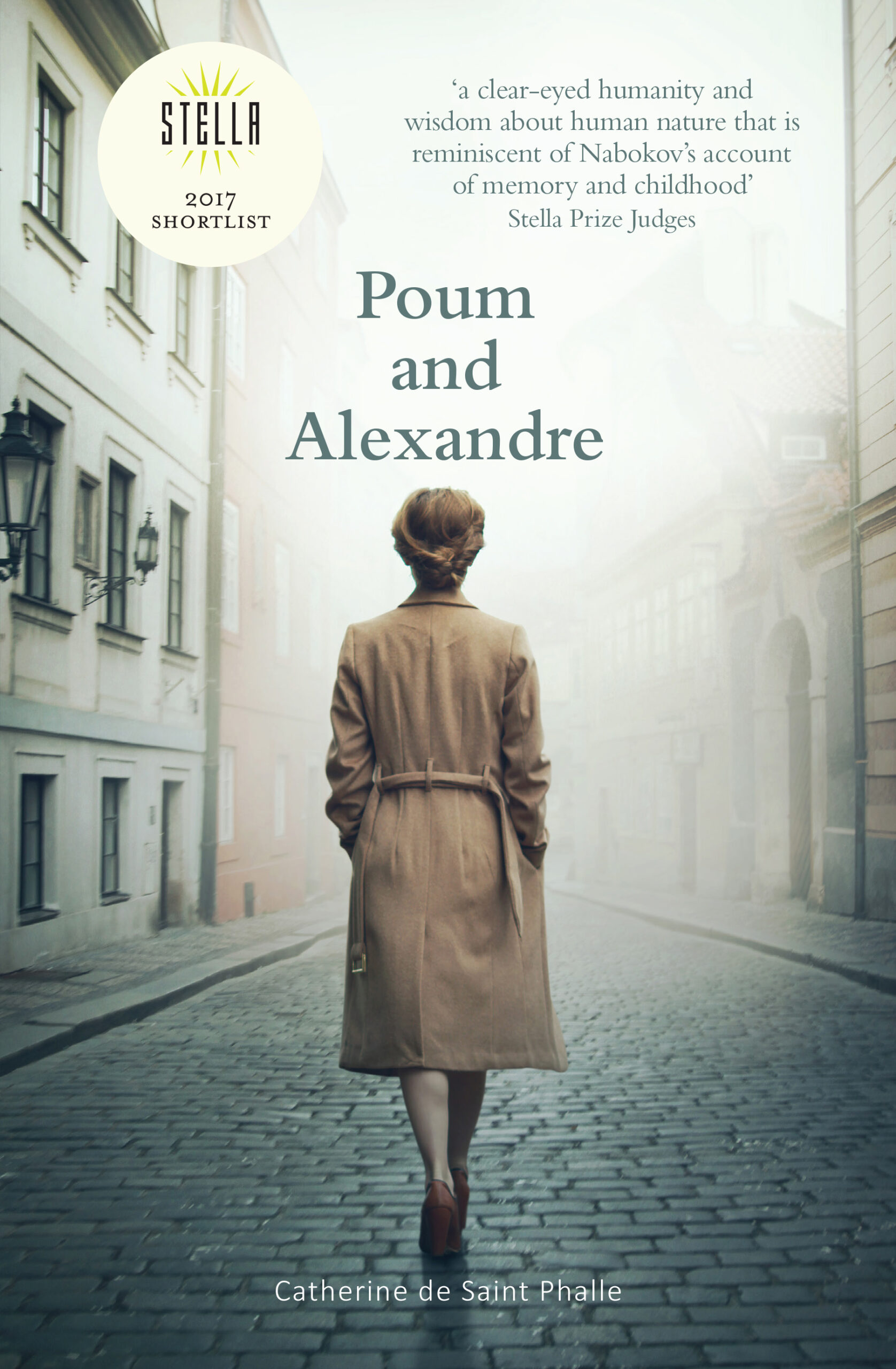Helen Garner’s launch speech for Poum and Alexandre, Readings Carlton 12 October 2016
At eight o’clock this morning I was on a tram, rolling along Flemington Road on my way to my office to make a few notes for what I’d say tonight about Catherine de Saint Phalle’s new book
The tram was packed but I got a seat. Someone opposite me stood up and a boy of six or seven was slid into the empty place by a harried-looking older woman, plainly his grandmother. The child was blond with a very large head, fine features, and hair cut short. He looked around brightly and said in a clear voice, to the passengers in general, ‘Good morning!’ The people around him didn’t raise their eyes from their phones. It was up to me: I could either machine-gun the lot of them or I could answer his greeting. I said ‘Good morning!’ He looked straight at me and held out his right hand to show me its palm. On that hand he had only three fingers. He twisted it into a private knot and laid it on his knee. He said, ‘I’m Mason. I’m a spy.’ I said, ‘Where do you spy?’ He said, ‘At school.’ ‘What do you see, when you spy?’ He said, ‘I see a ghost.’ ‘A ghost?’ ‘I see a girl. But she’s gone.’ ‘Where’s she gone? Why did she go?’ He raised one hand high above his head. ‘She got bigger and had to go to another school.’ I said, ‘Are you sad because she’s gone?’ This was a step too far. He dropped his eyes and began to worry at a loose thread on his cuff. ‘It’s all right, it’s only a thread—it’s only a thread,’ said his grandmother in a tone tinged with warning: her face was tired and lined but her expression when she smiled at me over his head was full of sweetness. ‘We’re going downtown for a while,’ she said to him, ‘and then we’ll come back to see your doctors.’
I’m telling you this because when I got off the tram, full of the nameless emotion that such an encounter evokes, I knew that the book I was holding in my hand, Poum and Alexandre, was the perfect one to comfort and steady me. I knew that its writer, Catherine de Saint Phalle, would see nothing strange in my desire to engage with the child, or in the conversation I had had with him. She would not see anything unacceptable in the child himself, and certainly not in his longing for the vanished girl.
I know this because Poum and Alexandre is a book about various kinds of longing – the sorts of longing that shape a life from childhood on. In her opening paragraph Catherine writes:
My mother, Marie-Antoinette, likes strange and sad things. It makes me want to save her … I dream of taking her away from the concierge who frightens her, the family that seems to dislike her, and the nuns of my school who terrify us both. I often imagine us in an empty house nestling in an overgrown garden.… I will paint it and repair it and make it very welcoming. We will live there together, my mother and I, in this secret house where she will be happy at last and talk to me and explain who she truly is.
On the one occasion when I met Catherine, she said to me cheerfully, ‘My parents were complitly MAD!’
And perhaps they were; but that madness brings into being the stream of mysterious beauty on which this very original memoir sails along.
The narrating voice of the book is intensely likeable – gentle, witty, well-read and highly articulate. Yet the story it struggles to unearth circles back and back to the bewildered innocence of a small girl who is lied to, neglected, palmed off on a hired minder, then suddenly, breathtakingly indulged in ways that only a city like Paris can provide.
As she puts it, ‘a strange, awful freedom pervades my childhood.’
The child is kept in ignorance of the essential things about her parents that most children are given as a birthright – the facts about where they come from, how they met, what their work is, how they fit into their wider family and into the world that surrounds them. ‘When I ask an uncomfortable question,’ she says, ‘they look at each other guiltily.’
Her parents are creatures of wonder to the child. They are grandly beautiful, clever and stylish, but somehow unreal, unworldly. They come and go from her daily life in ways she doesn’t understand. In fact it takes her a long time to realise that the visiting woman is her mother.
There is nothing like the withholding of facts to create in a child a powerful imagination – specially when the family concerned can trace its ancestry as far into the past as this one can. The child picks up and treasures random impressions: for instance, the fact that every morning, outside the house in Provence where her mother was brought up, the gardener raked into the gravel the family’s coat of arms. Later in the book, after a context has been created for it, we learn that this coat of arms shows a broken tower with its door kicked in.
As a teenager Catherine, whose parents are passionately involved with each other in a bizarre secretiveness about their past, is allowed what she knows is too much freedom. ‘Unlike other people of my age,’ she writes, ‘I am never asked where I go. Freedom has never really been a goal for me. It’s always been more of a household pact’. At sixteen she takes up with a bearded, bow-legged 45-year-old painter. ‘In spite of his deep mistrust of any man approaching me, Alexandre does not even check on this man. The mere mention of his name is enough to make my father beam. “Why, his ancestor’s coat of arms floated next to ours at the Crusades!”’
These are people with servants. Although they have a detailed knowledge of ancient history and entertain themselves endlessly by glorying in it, they are ‘baffled by the smallest chores… the world of “things” terrifies both my father and mother in different ways. They stare at the iron and ironing board as if they are UFOs. They peer into the oven and the washing machine with the fascinated gaze some people have in front of an abstract painting. They raid the kitchen cupboards for biscuits and chocolate. “Easy to open!” they scoff as they read the instructions and tear at the packaging.’
This is the sort of book that you read with a pencil in your hand. My copy has turned-down page corners and margins full of double lines and asterisks. The writing is strong, fresh and clear, studded with striking images and strange, dreamy, sometimes jolting flights of fancy. It moves back and forth in time in confidently mysterious swerves. Many times I laughed out loud. Sometimes I gasped – in shock, or at a moment of surprising insight. When Catherine’s father takes her to visit Napoleon’s tomb, talking with a confusing authority about his WW2 experiences in the Resistance, the girl remarks to herself that ‘Napoleon’s tomb is helpful. There is something about the bedraggled grandeur of it, the useless miles of marble, the Pyrrhic victory of ambition that leaves you feeling fresh and ready for anything.’
In short, I loved the book. It’s unique, and completely original. I find it hard to give an accurate description of it because of its shape-shifting, its constantly modulating tone. Sometimes it’s like music, sometimes like a painting.
In fact I read a description, only the other day, of a 17th century French painting. The review contained two short sentences that I admired. I cut them out and kept them. Suddenly, now, it occurs to me that they express in a flash of poetry the quality I find so hard to articulate in Catherine’s book:
‘A strange breeze blows within. Everything gold catches the light.’
*
This book is a wonderful expression of love. I can’t decide who I love more here, the elegant, reclusive Poum or the wild-minded resistance man Alexandre. Every page of this delightful memoir bubbles with their Parisian eccentricities. Theirs is a world of emperors and adventures with Homer and the Magna Carta.
What makes this story really sing is Catherine’s own journey within the tale towards understanding her flawed family world and her place within the chaos. Growing and flowering throughout the work is her own undying love for her unique guardians, Poum and Alexandre.
Ben , A&R Book World October 2016
Catherine de Saint Phalle’s first work of nonfiction, Poum and Alexandre: A Paris Memoir, is an intricately woven narrative that centres on the author’s eccentric and charmingly flawed parents. Her mother Poum is an ‘unmotherly’ woman with a penchant for Odysseus. Her father Alexandre is a banker who ‘smells of honey’ and is openly loved by women. It appears an amiable family unit for little more than a chapter, as childhood memories reveal a guilty secret that prompts disapproval and resentment from relatives and friends. I was particularly struck by the relationship between the younger Catherine and her father—the rambling joy that Alexandre elicits from their conversations and spirited games. De Saint Phalle’s memoir feels like an ode to storytelling, merging tales of Greek mythology and French history seamlessly into her own. It will undoubtedly reward history buffs, but may cause those unfamiliar with such references to stumble. Some readers might also find themselves envying de Saint Phalle’s autonomous childhood while simultaneously baulking at her parents’ frequent disregard for her wellbeing. This book will appeal to readers who take particular delight in unconventional families and Parisian quirks.
Sophie Teague, Books+Publishing 25 August 2016
Amid the deluge of memoirs, few are great literature. Poum and Alexandre is a rare and wonderful exception, a work that deserves to become a classic. Catherine de Saint Phalle, a French writer living in Australia, tells the poignant story of her mother, Poum, and her father, Alexandre, through the eyes of a child who is both enthralled and baffled by their relationship, their family ties and the past worlds that haunt them. The writing is full of fresh and original turns of phrase. Her troubled mother has “shipwrecked eyes”; as Alexandre recalls his time in the Resistance, “his face falls, cliff-like into a darker sea”. Their flaws and foibles are revealed without judgment, infused with humour and pathos by their observant child. Poetic yet down-to-earth, Poum and Alexandre is a work of sustained intensity, tenderness and generosity of spirit.
Fiona Capp, Age /Sydney Morning Herald 28 November 2016
Catherine de Saint Phalle’s tender portrait of a lifelong partnership deserves to be an instant classic of the biography genre. De Saint Phalle grew up in Paris, the only child of charming but damaged parents: fragile, death-obsessed Poum and ebullient, older Alexandre, whose lives were ruled by their “sin” of being unmarried. De Saint Phalle’s narrative of an unusual childhood with this haunted, sometimes childlike and deeply bonded couple is remarkable for its lack of self-pity and its depth of recollection. The reader is treated to a study of two wonderfully flawed people, meeting in the aftermath of war and negotiating a peculiar union of love and eccentricity. Always seeing Poum and Alexandre as people first, then parents, her book is both funny and tragic at the same time. De Saint Phalle writes with a clear-eyed humanity and wisdom about human nature that is reminiscent of Nabokov’s account of memory and childhood.
Stella Prize judges 2017






